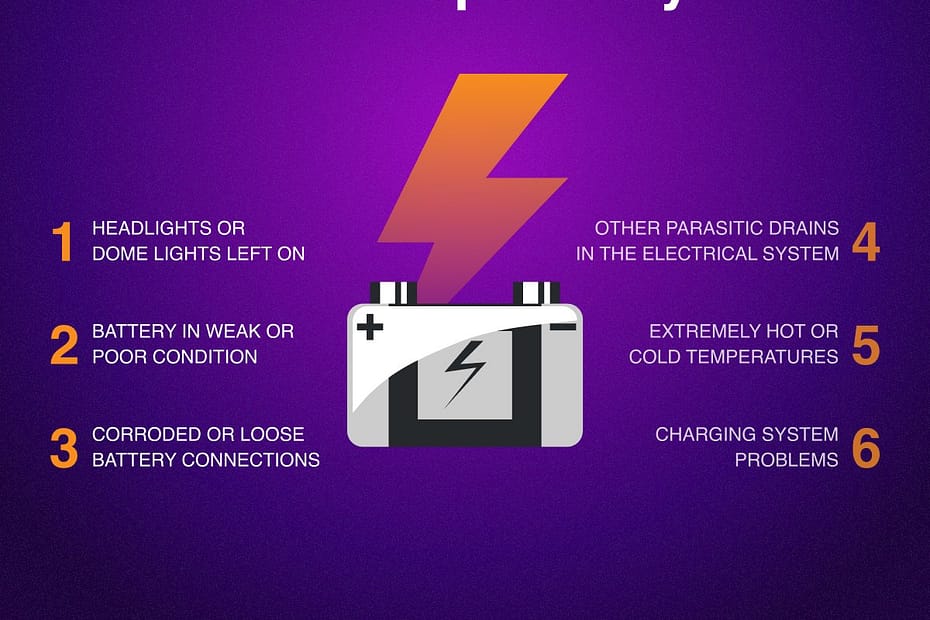A car battery dies when it loses its charge and can no longer provide the necessary power to start the engine and operate the electrical components of the vehicle. A car battery serves as the heart of a vehicle’s electrical system, providing the initial spark to start the engine and powering various functions such as lights, radio, and air conditioning.
However, over time, a battery can lose its charge due to factors like leaving lights on, cold weather, or simply reaching the end of its lifespan. When a car battery dies, it can leave you stranded and in need of a jump-start or replacement.
Understanding how a car battery dies can help you take the necessary precautions to prevent this inconvenience and ensure your vehicle remains reliably powered.

Credit: www.wired.com
Causes Of Car Battery Death
A car battery is a vital component that provides the necessary electrical energy to start a vehicle and power its electrical systems. However, car batteries can die unexpectedly, leaving you stranded with a non-starting engine. Understanding the causes of car battery death can help you take preventive measures and avoid inconvenient breakdowns.
Low Electrolyte Levels
One of the common causes of car battery death is low electrolyte levels. Electrolyte is a mixture of sulfuric acid and water that facilitates the flow of electric charge within the battery. Over time, electrolyte levels naturally decrease due to evaporation or boiling.
When the electrolyte levels drop too low, the battery’s capacity to hold a charge is severely diminished. This leads to weaker electrical output and, ultimately, battery failure. To prevent low electrolyte levels, it is important to regularly check the battery’s fluid levels and top it up with distilled water if necessary. However, be cautious not to overfill the battery as it can cause acid leakage and corrosion.
Corrosion On Terminals
Corrosion on terminals is another common reason for car battery death. The battery terminals, which are responsible for conducting electrical current to and from the battery, can become corroded over time.
Corrosion is usually caused by a buildup of sulfuric acid residue, which is a byproduct of the battery’s chemical reaction. This residue forms a layer of grime that impedes the flow of electricity. As a result, the battery must work harder to deliver the required power, leading to a shorter battery life.
To prevent terminal corrosion, it is advisable to regularly inspect and clean the battery terminals. Use a wire brush or a mixture of baking soda and water to gently remove any accumulated residue. Additionally, applying a thin layer of petroleum jelly to the battery terminals can help impede future corrosion.
Temperature Extremes
Temperature extremes, whether excessively hot or cold, can wreak havoc on car batteries. Extreme heat accelerates the corrosion process and can lead to internal damage, while severe cold diminishes a battery’s ability to generate power.
During hot weather, the electrolyte inside the battery evaporates at a faster rate, causing the fluid levels to decrease and resulting in decreased battery performance. On the other hand, in freezing temperatures, a battery’s chemical reactions slow down, reducing its overall power output.
To mitigate the impact of temperature extremes on your car battery, park your vehicle in a shaded area or a garage during hot weather. Using insulation blankets or battery warmers in cold weather can also help maintain optimal battery performance.

Credit: www.ocregister.com
Effects Of A Dead Car Battery
A dead car battery can result from various factors, such as excessive heat, frequent short trips, or leaving lights on. Lack of proper maintenance can also contribute to its demise. When a car battery dies, it can lead to a host of inconveniences, including being stranded and unable to start the vehicle.
Impact On Vehicle Performance
A dead car battery can have several detrimental effects on the performance of your vehicle. When the battery dies, the electrical system that powers your car’s components also fails, which can lead to a variety of problems. One of the noticeable impacts is the inability to start your vehicle. This means that you may find yourself stranded and unable to go about your day as planned. Additionally, a dead car battery can also lead to poor engine performance. Since the battery is responsible for powering the ignition system, a dead battery can result in sluggish acceleration, stalling, or even a complete loss of power while driving. Clearly, the impact on vehicle performance can be significant and should not be overlooked.Potential Damages To Electrical Components
When a car battery dies, it is not only inconvenient but can also cause potential damages to the electrical components of your vehicle. The electrical system of your car plays a vital role in powering various functions such as lights, radio, air conditioning, and other electronic devices. A dead car battery can cause voltage spikes and fluctuation in the electrical system, which can damage sensitive electronics. These electrical damages can be costly to repair and may even require the replacement of certain components. Furthermore, a dead battery can also lead to the loss of important settings and configurations in your car’s computer system, resulting in the need for reprogramming or resetting. In summary, a dead car battery can potentially cause significant damages to the electrical components, leading to expensive repairs and inconvenience.Preventive Measures
Car battery failure can be an inconvenience and a potential safety hazard, but there are preventive measures you can take to extend its lifespan and minimize the risk of unexpected breakdowns.
Regular Maintenance And Inspections
Regular maintenance and inspections are crucial for ensuring the longevity of your car battery. Scheduled checks at a trusted mechanic can identify any potential issues before they escalate, and prompt replacement of a failing battery can prevent being stranded unexpectedly. Proper maintenance also includes checking the terminals and ensuring they are free from corrosion, which can hinder the battery’s ability to charge and discharge efficiently.
Avoiding Extended Periods Of Inactivity
Extended periods of inactivity can lead to the discharge of the battery, ultimately reducing its lifespan. If possible, try to take short drives to keep the battery charged, or consider using a trickle charger to maintain its charge during prolonged periods of inactivity, such as when the vehicle is parked for an extended time.

Credit: ericsautohamilton.ca
Frequently Asked Questions On How Does A Car Battery Die
What Drains A Car Battery When Car Is Off?
Common reasons for car battery drain when off include faulty electrical components, interior lights left on, parasitic drains, and extreme weather conditions.
Can A Car Battery Die Suddenly?
Yes, a car battery can die suddenly due to various factors like extreme temperatures, old age, or electrical drain. Regular maintenance and checks can help prevent sudden failure. If you notice any signs of a weakening battery, such as slow cranking or dim lights, it’s best to address the issue promptly.
How Long Does It Take For A Car Battery To Die?
A car battery can die in about 2 to 5 years, depending on usage and maintenance. Regularly driving your car helps keep the battery charged, while leaving it unused for long periods can cause it to drain faster. Good maintenance practices like cleaning terminals and checking fluid levels can prolong battery life.
Can A Battery Die While Driving?
Yes, a battery can die while driving. This can happen if the battery is old or faulty, or if there is a problem with the vehicle’s charging system. It is important to have the battery and charging system checked regularly to avoid unexpected breakdowns on the road.
Conclusion
In sum, understanding the various causes behind a car battery dying can help you take proactive steps to prevent such issues. By keeping your battery properly maintained and being mindful of its lifespan, you can extend its longevity and ensure you’re not left stranded with a dead battery.
Regular inspection and professional maintenance is crucial to keeping your car battery in excellent condition for long-term reliability.
